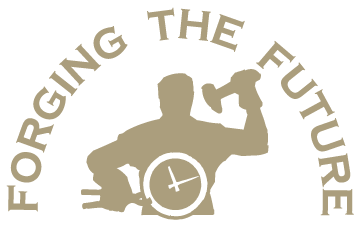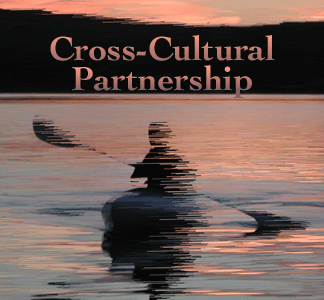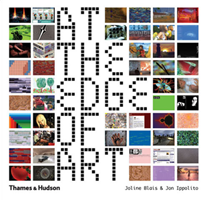
News from the Still Water blog
 This April’s teleconference from UMaine’s Digital Curation program looks at the practical and ethical issues of integrating AI into archival workflows—and how human crowdsourcing can fill in the gaps. Archivists and curators are debating who—or what—should manage 21st-century archives. Should collection managers exploit the potential gains of extracting, describing, and discovering data with AI, or […]
This April’s teleconference from UMaine’s Digital Curation program looks at the practical and ethical issues of integrating AI into archival workflows—and how human crowdsourcing can fill in the gaps. Archivists and curators are debating who—or what—should manage 21st-century archives. Should collection managers exploit the potential gains of extracting, describing, and discovering data with AI, or […]
 When he died last Wednesday, artist Mel Bochner left a body of work that’s gained in relevance in a half century defined by information—even more so in the age of AI. The artist’s death holds special meaning for me because he was a mentor when I was in graduate school at the Yale School of […]
When he died last Wednesday, artist Mel Bochner left a body of work that’s gained in relevance in a half century defined by information—even more so in the age of AI. The artist’s death holds special meaning for me because he was a mentor when I was in graduate school at the Yale School of […]
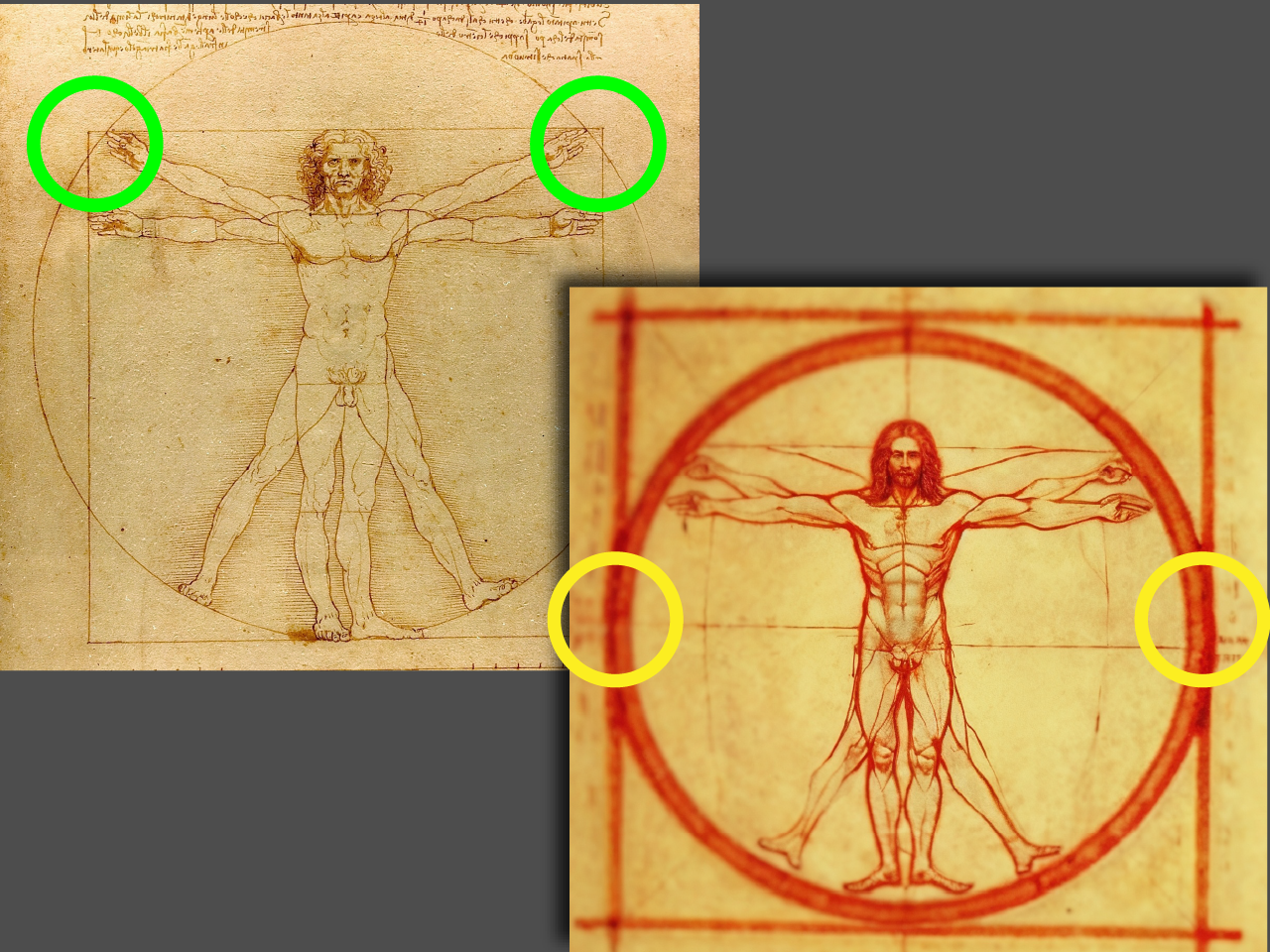 Most of us know by now that generative AI can promote stereotypes based on biased data. Yet even when the training data is saturated with perfectly accurate representations—and little to no inaccurate ones—the results can still be biased. Why is this so? To demonstrate this, I prompted an image generator for two of the most […]
Most of us know by now that generative AI can promote stereotypes based on biased data. Yet even when the training data is saturated with perfectly accurate representations—and little to no inaccurate ones—the results can still be biased. Why is this so? To demonstrate this, I prompted an image generator for two of the most […]
 What happens to ground truth when finding a factoid or photo no longer means consulting an archive but generating one from scratch? That’s the question that drives “Honey, AI Shrunk the Archive,” an essay I wrote for the forthcoming anthology New Directions in Digital Textual Studies.
What happens to ground truth when finding a factoid or photo no longer means consulting an archive but generating one from scratch? That’s the question that drives “Honey, AI Shrunk the Archive,” an essay I wrote for the forthcoming anthology New Directions in Digital Textual Studies.
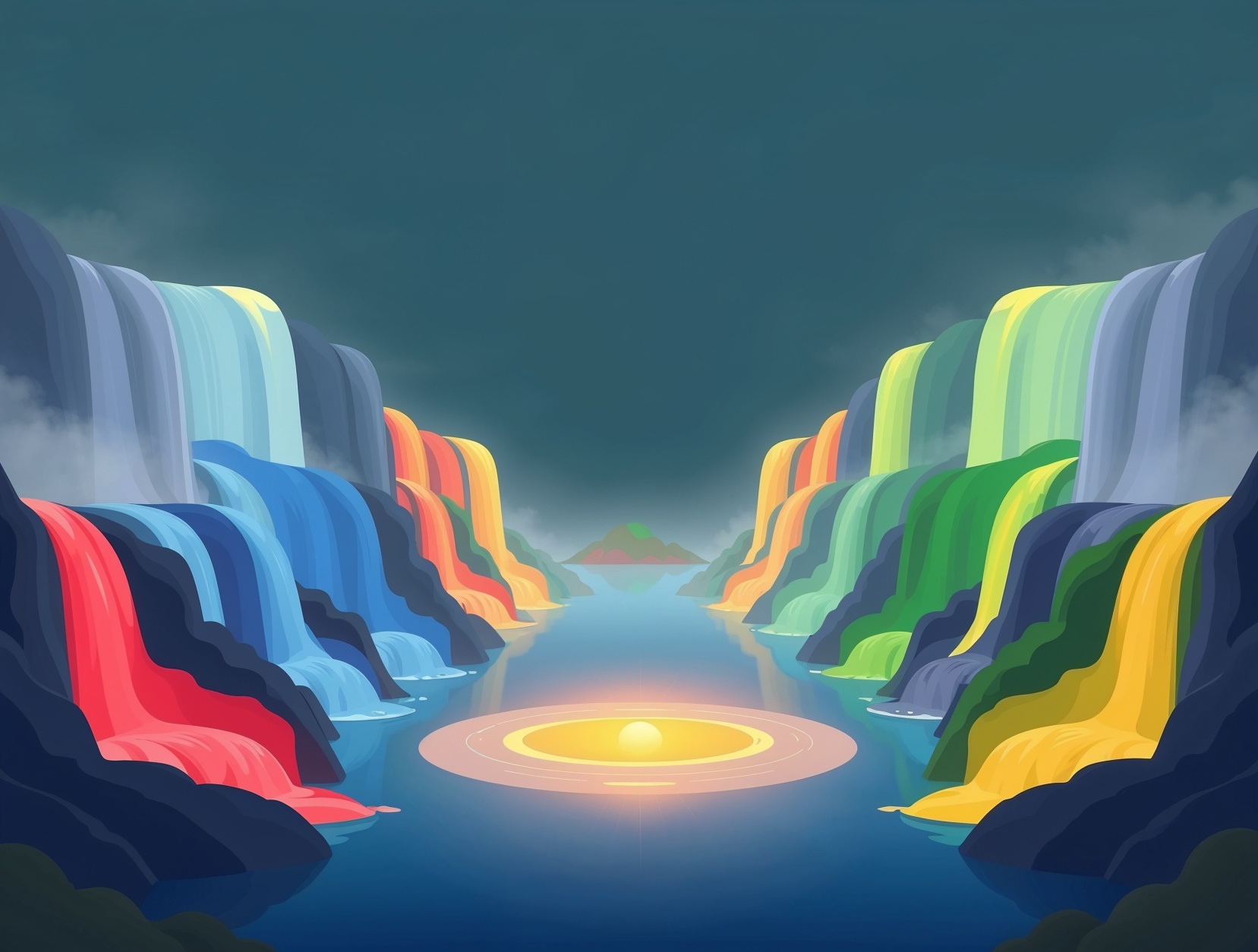 Diversity without cacophony Group discussions on controversial subjects can open students to more viewpoints, but they can also result in the usual suspects—sometimes the most thoughtful students, but often just the loudmouths—dominating the conversation. So I was intrigued when Greg Nelson and Rotem Landesman, my collaborators on a course that examines in-depth the impact of […]
Diversity without cacophony Group discussions on controversial subjects can open students to more viewpoints, but they can also result in the usual suspects—sometimes the most thoughtful students, but often just the loudmouths—dominating the conversation. So I was intrigued when Greg Nelson and Rotem Landesman, my collaborators on a course that examines in-depth the impact of […]
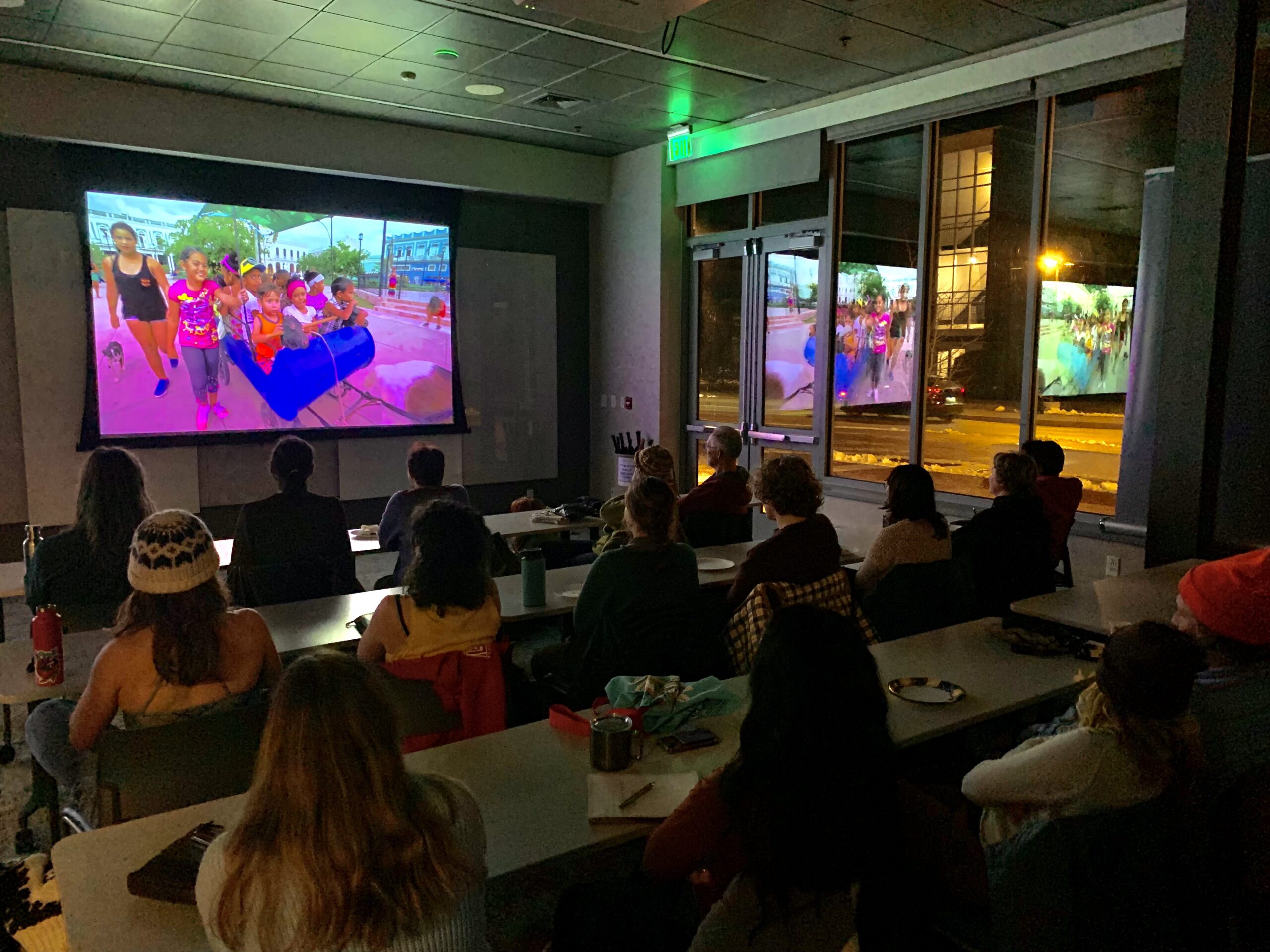 What’s the connection among happiness, women’s empowerment, and sustainable living? This week a UMaine course in permaculture hosted a lively discussion on this question with the director of an award-winning documentary. December 3nd at the Fernald Center saw a packed audience attend a screening of Saving Walden’s World, a documentary that examines the correlation between […]
What’s the connection among happiness, women’s empowerment, and sustainable living? This week a UMaine course in permaculture hosted a lively discussion on this question with the director of an award-winning documentary. December 3nd at the Fernald Center saw a packed audience attend a screening of Saving Walden’s World, a documentary that examines the correlation between […]
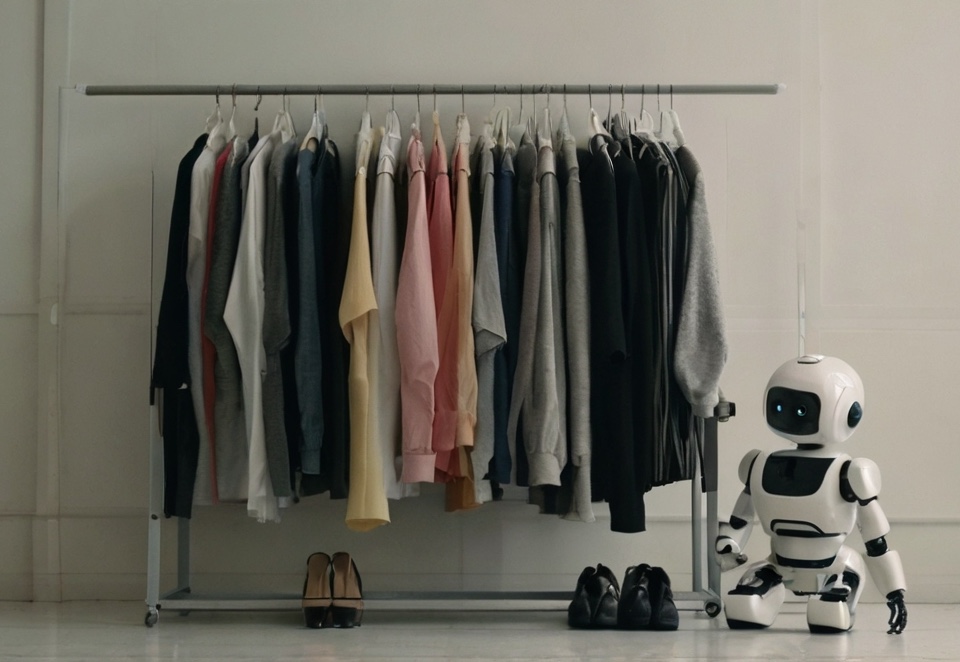 When a tech reporter for the NY Times outsourced her decisions for a week to ChatGPT, she complained that “AI made me basic.” But it turns out the math behind generative AI can lead to results that are blandly average or wildly inaccurate. Kashmir Hill’s idea to let generative AI dictate everything from her haircut […]
When a tech reporter for the NY Times outsourced her decisions for a week to ChatGPT, she complained that “AI made me basic.” But it turns out the math behind generative AI can lead to results that are blandly average or wildly inaccurate. Kashmir Hill’s idea to let generative AI dictate everything from her haircut […]
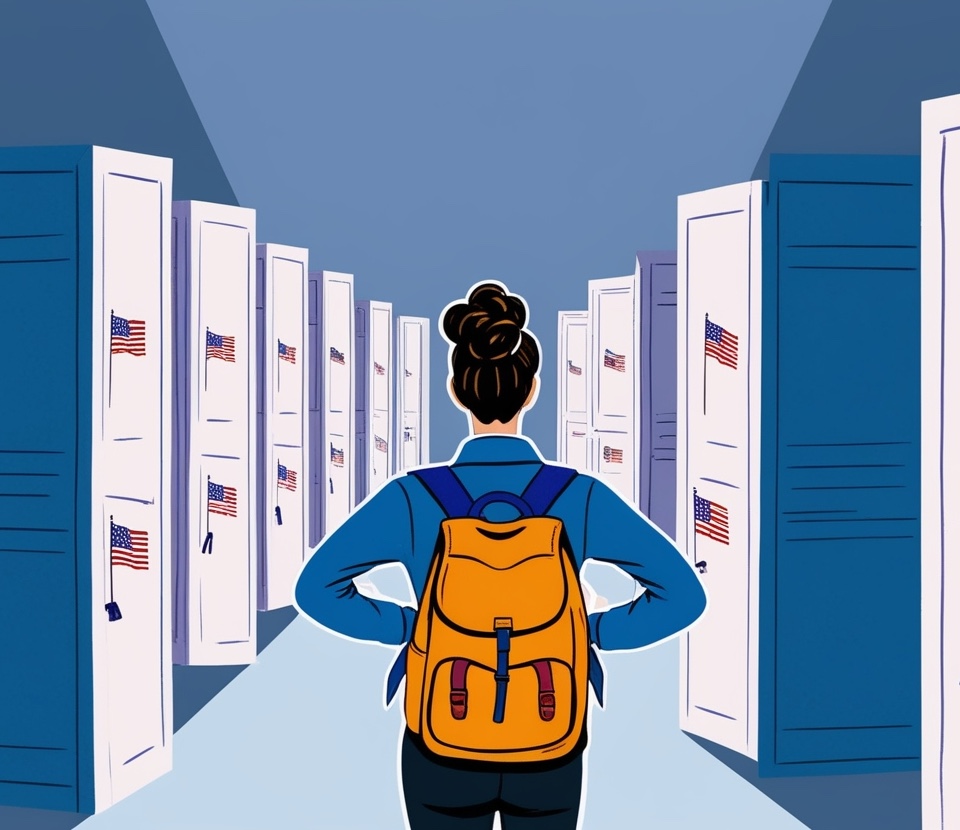 A new tool hopes to drive more students to the polls, and it uses AI under the hood to help. The rise of generative AI has already threatened democracy in a variety of ways, from deep fakes of high-profile figures like President Biden to personalized attacks on local figures like high school principals. But is […]
A new tool hopes to drive more students to the polls, and it uses AI under the hood to help. The rise of generative AI has already threatened democracy in a variety of ways, from deep fakes of high-profile figures like President Biden to personalized attacks on local figures like high school principals. But is […]
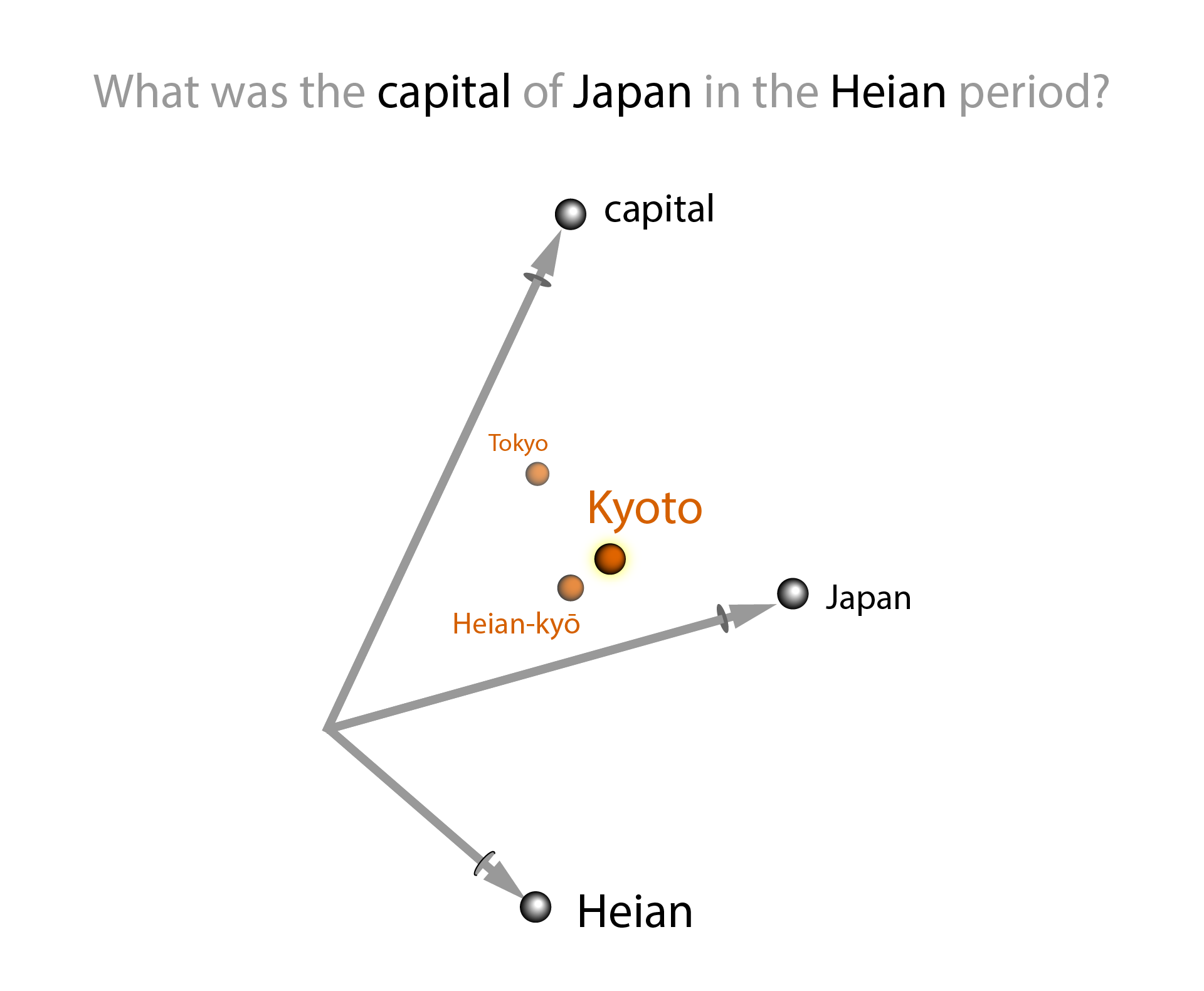 AI advocates have expressed frustration at Ted Chiang’s critique of AI in The New Yorker, where he argued that large language models “take an average of the choices that other writers have made.” Yes it’s a simplification, but it’s also correct at a fundamental level. Chiang’s criteria for artistic quality—eg, the number of choices made […]
AI advocates have expressed frustration at Ted Chiang’s critique of AI in The New Yorker, where he argued that large language models “take an average of the choices that other writers have made.” Yes it’s a simplification, but it’s also correct at a fundamental level. Chiang’s criteria for artistic quality—eg, the number of choices made […]
 Deep-faked images and other media may get all the headlines when it comes to endangering democracy, but the 2024 Maine Town Meeting revealed that the rise of generative AI arms saboteurs with many more insidious ways to destabilize elections. With high stakes elections coming in the US, India, South Korea, and elsewhere in 2024, leaders […]
Deep-faked images and other media may get all the headlines when it comes to endangering democracy, but the 2024 Maine Town Meeting revealed that the rise of generative AI arms saboteurs with many more insidious ways to destabilize elections. With high stakes elections coming in the US, India, South Korea, and elsewhere in 2024, leaders […]
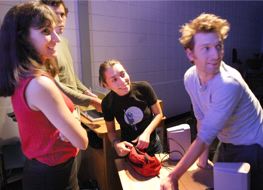
These include transparency, open access to ideas and code; variability, the capacity to morph into new configurations as the need arises; and stillness, a rare quality in today's frenetic culture but one demanded by any creative endeavor. Still Water is not a center--for a successful network has none--but a medium primed for the transmission of multiple waves of culture.
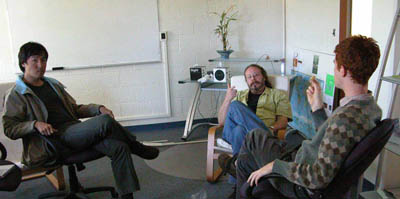
Outfitted with 17-inch PowerBooks, Linux and Windows desktop computers, and 42-inch flat screens, the lab is meant as a flexible multi-purpose space for ongoing new media projects open to community observation or participation. The lab is a hub for ultra-high bandwidth Internet 2 multicasts and networked performances.
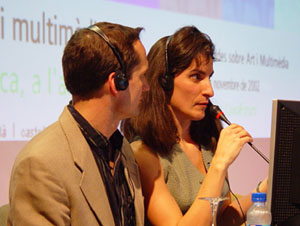
http://newmedia.umaine.edu/stillwater/press.html
Or feel free to contact us directly.
Connecting creators and communities for the public good
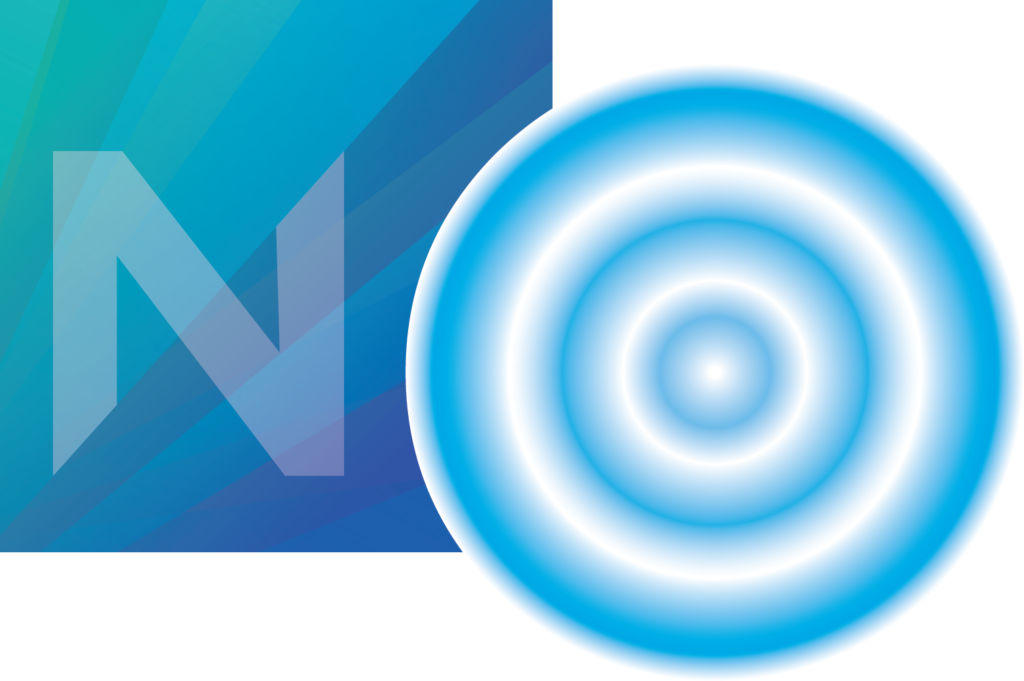
The Ripple initiative aims to listen and respond to community need with practical tools from digital designs to websites to mobile apps. Firms dedicated to helping local ecosystems to thrive are especially encouraged to apply. We see this as a fulfillment of the University of Maine’s obligation as a land- and sea-grant university to serve the earth and its people.
Nonprofits and businesses working for public causes will be able to apply for support from faculty and students in New Media and other programs. For their part, students who participate in Ripple earn hands-on experience working with clients for the public good, and make connections that can be valuable for their future careers.
More...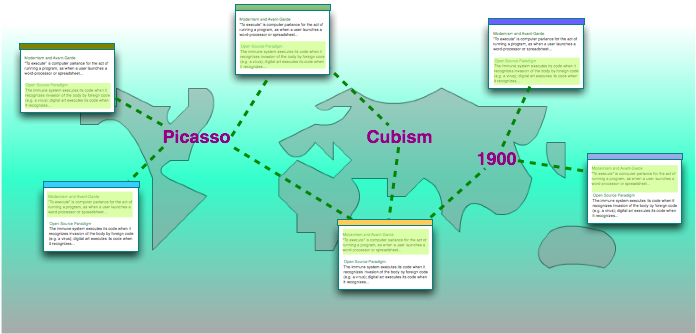 Finding scholarly writing online used to be a shot in the dark; an academic paper on Cezanne's figure paintings, for example, is unlikely to rank high on a Google search for "nude bathers."
Finding scholarly writing online used to be a shot in the dark; an academic paper on Cezanne's figure paintings, for example, is unlikely to rank high on a Google search for "nude bathers."
Now Still Water has launched a new tool designed to overturn this "lottery" approach by meshing the thoughts of writers from across the Web. Called ThoughtMesh, this software creates clouds of smart keywords that connect excerpts of essays published on different Web sites. More...
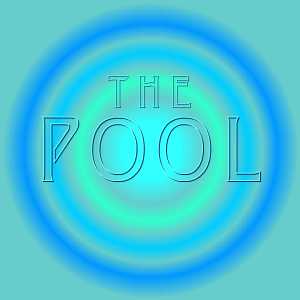
The Pool's structure emphasizes distributed learning and authorship. Contributors can propose a concept for others to implement, or respond to invitations to explore, debug, or remix existing works. Thanks to an innovative graphical interface, when Pool surfers review artworks, programs, and texts, the ratings they give these works ensure that the best of them will be most visible to future surfers.
Even in its beta version, The Pool made the top headline in Wired magazine's online news site in 2003. Soon afterward the Wired profile was blogged by over 40 online commentators, becoming the fourth-most commonly cited article in blogs worldwide as of late December 2003. Visit site...
network
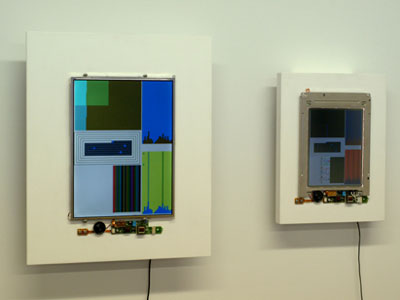
The Variable Media Network's paradigm and projects have been featured in The New York Times, the Los Angeles Times, ArtNews, Wired, and the Chronicle of Higher Education.
The Network has produced the exhibition Seeing Double: Emulation in Theory and Practice, the publication Permanence Through Change, and the conferences Preserving the Immaterial and Echoes of Art.
Visit site...
Still Water has received a $300,000 NEH grant for its work as lead organization of Forging the Future: New Tools for Variable Media Preservation. This consortium of museums and heritage organizations is devising and building tools to safeguard digital culture from the ravages of time.
The tools produced by Forging the Future are based on the variable media paradigm, which concentrates on the behaviors, rather than solely the material, of contemporary artifacts made in ephemeral mediums. The variable media paradigm asks creators themselves, rather than just technicians and conservators, to imagine ways to outwit the obsolescence that often besets technological and other ephemeral art forms.
There are three practical and complementary tools that will be developed in this project: the Variable Media Questionnaire (VMQ) contains metadata necessary to migrate, re-create, and preserve variable media objects; the Digital Asset Management Database (DAMD) manages digital objects or documentation files and related metadata; and the Franklin Furnace Database (FFDB) is for cataloging physical archives of arts organizations. More...
How can the free access to information required for a democratic society be reconciled with the privacy rights of electronic citizens? Still Water's Cross-Cultural Partnership brings together people from different networks, both indigenous and electronic, for the purpose of envisioning a legal and cultural framework for sharing connected knowledge in a way that is responsible and sustainable.
Meant to be tailored to each circumstance, the framework encourages partners to define and abide by practices that emphasize kinship rather than competition, participation rather than passivity, genealogy rather than genius. More...
 The We Take Care of Our Land campaign, organized by one of the contributors to the Cross-Cultural Partnership, aims to safeguard pristine Passamaquoddy Bay from industrial encroachment. Contribute today!
The We Take Care of Our Land campaign, organized by one of the contributors to the Cross-Cultural Partnership, aims to safeguard pristine Passamaquoddy Bay from industrial encroachment. Contribute today!
Still Water is collaborating with faculty from Art, Computer Science, Fogler Library, the Hudson Museum, and other University of Maine departments to offer a two-year graduate certificate, taught online beginning in September 2012, intended for people working in museums, archives, artist studios, government offices, and anywhere that people need to manage digital files. The program walks students through the phases of managing digitized or born-digital artifacts, including acquisition, representation, access, and preservation.
For a photo archivist, for example, these courses would answer questions like how to scan analog photos into a database, how to add metadata to make them searchable online, and how to cope with the rapid obsolescence of the software and hardware used to catalogue them.
Although the certificate is designed to be completed in two years, part-time students may choose to spread the 18 credits (6 courses) over a longer period. To make things easier for students currently working in collecting institutions, we have designed the final course as an internship that may take place in the student's own workplace.
Net-zero energy homes, food growing in your backyard, and consensus governance
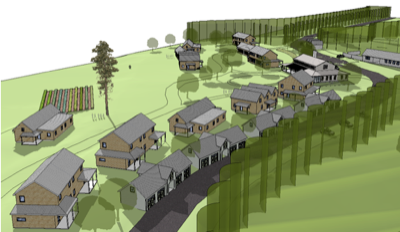
Belfast Cohousing & Ecovillage is a sustainable community on the coast of Maine that has been called "the future of housing."
Still Water Co-Directors Joline Blais and Jon Ippolito are founding members of the Ecovillage, along with 20 other families dedicated to this self-developed and self-financed neighborhood. Its home design, by G•O Logic, won the 2011 LEED Project of the Year.
Apart from net-zero energy homes, the project features a Book of Commons ensuring that all residents share in a large Common House, food growing in their backyard, and governance by consensus. Blais conducted an analysis of energy production and cost savings for the community that revealed a family of four could save over $100,000 in 20 years by living in cohousing.
The project has been the subject of numerous television, newspaper, and radio stories.
Visit site...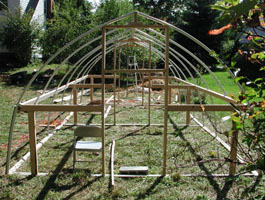
Based on the Wabanaki Longhouse model and permaculture design principles, this living/learning center features a multi-age school (Wassookeag), college student interns, and a team of hands-on advisors. LongGreenHouse will produce its own food in sustainable gardens, food forests, aquaculture and a four-season greenhouse, and aim at total recycling of all organic matter and zero waste. The house will be retro-fit with passive solar heat and active solar hot water, rainwater collecting, grey water management, and stream revitalization. Peace initiatives will focus on relations to all local living beings, including indigenous life forms and indigenous peoples as well as exploring strategies for becoming indigenous. Visit site...
RFC (Request for Ceremony) is a call for individuals to re-connect to the land around them by inventing ceremonies to accompany moments from their daily lives. In a deliberate echo of the "Requests for Comments" that generated the protocols now governing today's Internet, RFC takes the form of an online community repository. In keeping with the project's focus on the earthly rather than the ethereal, Still Water's repository includes categories such as Home and Healing rather than Telnet and TCP. Contributions to RFC to date include a ceremony devised by gradeschool kids for healing pruned trees, a birthday walk conducted by a Montessori teacher, and a tattoo ritual by a college student intent on warding off stereotypical body images.
RFC is featured work in the exhibition Nature Version 2.0: Ecological Modernities and Digital Environmentalism at Colgate University from January 21 to February 16, 2008 and at the conference Subversion, Conversion, Development: Public Interests in ICT at Cambridge University from 24-26 April 2008. RFC is produced as part of Still Water's LongGreenHouse initiative, devoted to fostering ties between sustainable and indigenous cultures.

Funded by a generous grant from the Rockefeller Foundation, the Open Art Network already includes projects by a half-dozen artists, including jodi, Mark Napier, and Mark Daggett, with more projects in the pipeline.
The Open Art Network is also taking the lead in developing a new form of open license that mandates access to the source media for digital art.
Visit site...
Participants from more than a dozen indigenous and developed nations converged on the Banff New Media Institute from 25-29 July 2007 for the second Connected Knowledge conference. Organized by Still Water, this summit focused on the connections between electronic and indigenous networks, and featured working groups devoted to education and gaming, archiving native heritage, new legal paradigms for responsible sharing, and "glocal" trust networks. More...
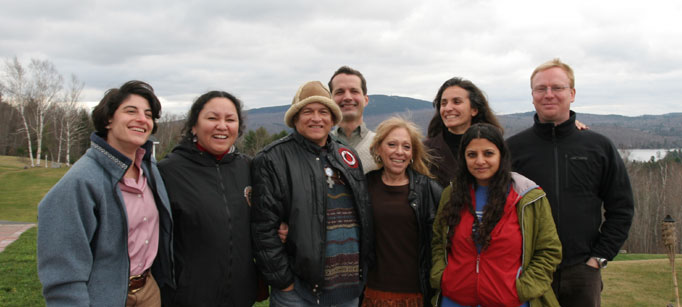
In November 2006, Still Water organized a summit at Lucerne-in-Maine with Wabanaki elders, legal scholars, anthropologists, and network activists to devise an ethical framework for sharing knowledge and heritage across cultures. The result was the Cross-Cultural Partnership and the first of the Connected Knowledge conferences. More...
Far from the studios and galleries that sheltered art in past centuries, creative people sitting at computer keyboards are tearing apart and rebuilding their society's vision of itself. Though they may call themselves scientists, activists, or hackers rather than poets or performers, today's electronic visionaries are redefining art for the Internet age.
This book by Still Water co-founders Joline Blais and Jon Ippolito charts art's recent eruption in fields as diverse as artificial life, computer games, and community activism, revealing a seismic shift in the role it plays in society. No longer content to sit on a pedestal or auction block, these works infiltrate stock markets, sway court cases, and network bedrooms, reaching across the globe to expand the edge of art. More...
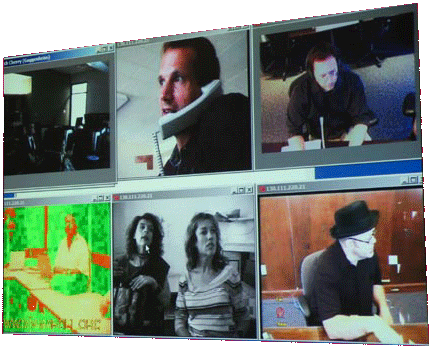
Still Water, along with the University of Maine's Collaborative Media Lab, has played a strong role in the development of MARCEL, an ultrahigh-bandwidth network dedicated to uniting artists and scientists in cross-cultural and cross-discipline presentations, performances, and conversations.
Still Water has coordinated MARCEL teleconferences on network collaboration, digital video archiving, and the future of code.
More...
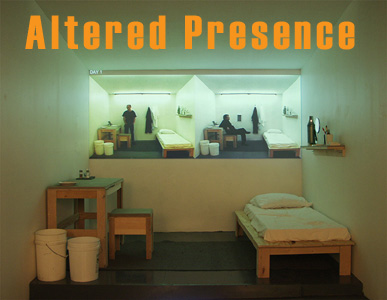
This fourth installment in the Code and Creativity series features visiting artists whose projects shift across scales of time or space.
Works discussed include sculptures that amplify the sound of sap rising in a tree or seismic tremors from deep in the earth, net art "updates" of 40-year-old paintings, and a year-long performance reborn on a computer screen.
Organized by Still Water and the New Media Program, the week's events include artist talks, hands-on technical workshops, and a panel discussion. More...
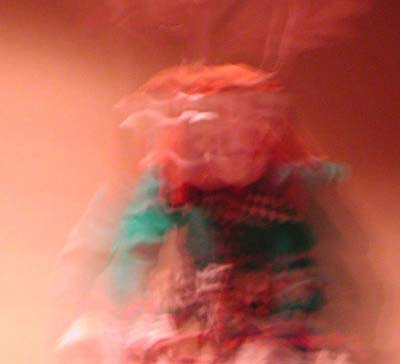
The Passamaquoddy word kehsatokot signifies length of a "braid" or "story", from their tradition of telling stories as they braid the ceremonial sweetgrass. This "braiding", "kestakenikan" will be the model for both the technique of storytelling, and the content of the stories.
A story-braid is a live interweaving of stories in which each storyteller adds her strand, but in a way that respects and honors the other strands. In the end an interactively produced story emerges that becomes greater than the sum of its strands.
More...

The Maine Intellectual Commons Web site includes up-to-date information on the progress toward these initiatives as well as archives from the University of Maine's 2004 Conference on the Intellectual Commons, featuring MIT's Hal Abelson, Creative Commons' Neeru Paharia, and SPARC's Peter Suber.
The goal of this broad-reaching initiative is to establish standards for creative and scholarly research that contribute to a culture of sharing rather than hoarding. More...

Founded on the presumption that democratic principles are served by democratic ends, this collaborative Web site originally created for the 2004 American election enabled potential voters to inform themselves and to inform others about trenchant issues affecting the University of Maine community and its neighbors. The 2006 version has been updated to include new Wiki features and up-to-date issues and candidates.
Students represent a powerful and often underestimated force in electoral politics, and this community-driven wiki aims to remind them of the responsibility that goes along with that power.
The site includes election information, instructions for voting in your district, and--most importantly--contributions to the debate from community members on all sides of the issues.
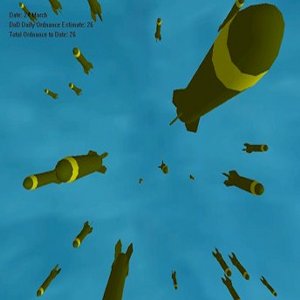
This third conference in the "Code and Creativity" series assembles six international game scholars and artists in 2004 to discuss the state of the art in conflict simulations for military and entertainment purposes.
Independent game designers and artists Ruth Catlow, Mary Flanagan, Alex Galloway, John Klima, and Anne-Marie Schleiner debate the ethics of America's Army and other recruiting games, conduct workshops to critique student game designs, and participate in a RPG Roundtable role-playing game.
Conference sessions also present alternative conflict games that challenge prevailing game paradigms, from Sheik Attack to Velvet Strike to Three-Person Chess.
Click here for a detailed schedule, images, and information about the participants.
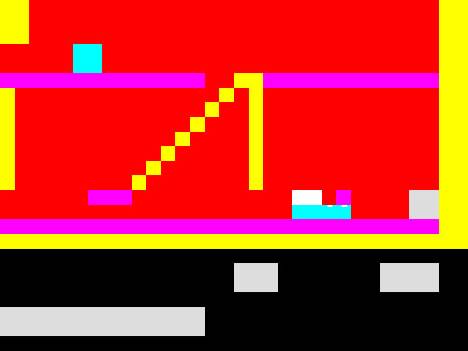
Presenters include the acclaimed net artists Eryk Salvaggio and jodi, as well as University of Maine undergraduate and graduate students. More...
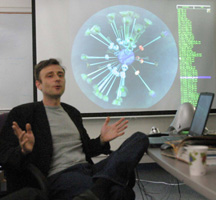
Presenters at these events include world-renowned artists and scholars, from software artists Alex Galloway, John Klima, and Mark Napier to blog diva Liza Sabater to Whitney Museum curator and author Christiane Paul.
University of Maine undergraduate and graduate students also present original works of creative software. More...
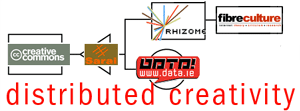
Distributed Creativity wove together correspondents from separate email lists based in California (Creative Commons), New York (Rhizome), Ireland (DATA), India (Sarai), and Australia (Fibreculture) in a global conversation on the future of creativity, intellectual property, and mobile media.
Weekly topics included:
- Copyleft, Right & Center: Innovations in Law
- Mobile Creativity: Innovations in Technology
- Digital Karma: Innovations in Ethics
- Whose Version: Innovations in Authorship
- Mod the Market: Innovations in Commerce
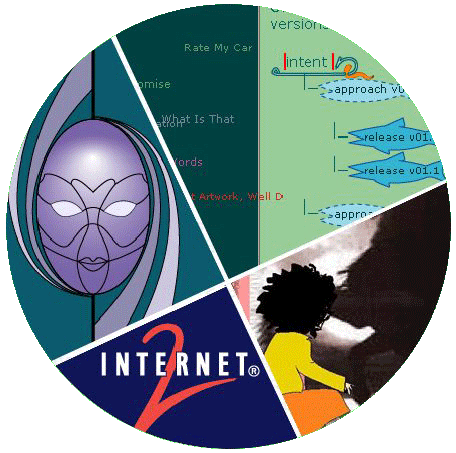
The result was CodePlay, an ensemble of projects including ALICE (an Artificial Intelligence that monitors web health), The Pool (a virtual community for distributed creativity), Breakdown (a cultural-code-busting game prototype), and Internet2@UMe (a broad-band protocol for connecting university artists, researchers and faculty).
These "open" projects approached code as tool, content, meme, and structure, and invited active participation by Ars visitors. Visit site.
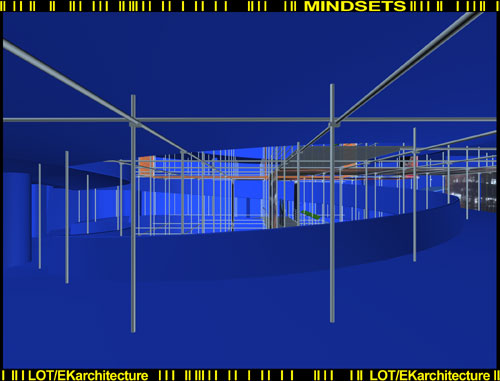
The selection and placement of the projects on view will be determined by visitors' choices rather than by a predetermined curatorial agenda. Technical experts from the University of Maine and other prominent media labs will be contributing to the design of this unusual environment. Visit site.
Indigenous media practitioners explore new political strategies and tools, especially the power of networking like-minded communities for local/global actions and sharing of resources. Yet they also attempt to learn from the social, cultural and ecological practices of indigenous peoples, especially those in our own regions. Conversely, Indigenous media practitioners are often committed to helping indigenous people regain and protect their sovereign rights.
The Dawn Commons, an indigenous media project co-ordinated by Still Water co-director Joline Blais, is an open resource for community building and political action for local cultures from the St Lawrence River to the Gulf of Maine, from the tip of Provincetown to the Gaspé Peninsula. The Dawn Commons also seeks to form alliances and networks with indigenous groups across the Americas and across the world to help each other defend and protect our local communities and bioregions.
Still Water co-director Joline Blais's research takes a hard look at the dangers inherent in this addictive medium, but also explores its potential by envisioning games that go beyond the shoot-em-up model to investigate alternative forms of conflict resolution.
Genre-breaking game designs that UMaine students are developing in conjunction with this research include Breakdown, whose protagonist is a five-year-old girl with the capacity to remake the world, Eagle and Condor, a conflict resolution game based on an ancient Hopi prophecy, and GIY (Grow It Yourself), an Alternative Reality Game for connecting students to the land.
Still Water co-director Jon Ippolito investigates open software both as a theoretical paradigm and as a practical method for building applications.
Still Water projects frequently run on PHP, MySQL, and other open server languages, but Ippolito is especially interested in hybrid client-side techniques such as DHTML, object-oriented JavaScript, and remote scripting.
In all of these clashes, Still Water researchers see their role as demonstrating how networks can help us learn, create, and even survive. Networks are here to stay. We can resist them in vain, or we can embrace them, adapting them to constructive purposes like building communities or waging politics.
Networks are proliferating and evolving so quickly in contemporary culture that it is difficult even to list their many mutations--instant messaging, blogs, wikis, mobile-phone texting, social networks, trust metrics, broadcatching. Still Water researchers investigate these forms not by conducting controlled experiments in a laboratory, but by introducing experimental ideas and applications into the uncontrolled wilderness of today's new media ecosystem.
Still Water Research Fellows participate in Still Water programs and pursue their own research under its umbrella. Research Fellows study, critique, and/or build networks--whether electronic, natural, or indigenous.
Find out more about past Research Fellows via the links at left.
 In the winter of 2012, Morgane Stricot was a Still Water Research Fellow in Residence exploring variable media approaches to conserving digital art. Morgane was in the 4th year of the Conservation-Restoration Department of the École d'Art d'Avignon, where she worked with Lionel Broye in the Laboratoire des Variables Médias.
In the winter of 2012, Morgane Stricot was a Still Water Research Fellow in Residence exploring variable media approaches to conserving digital art. Morgane was in the 4th year of the Conservation-Restoration Department of the École d'Art d'Avignon, where she worked with Lionel Broye in the Laboratoire des Variables Médias.
Morgane interviewed a half-dozen prominent artists about how their work should be preserved in the future, including Nicolas Frespech, SR Labo, Scott Snibbe, Lia, and Annie Abrahams. These interviews are now accessible via the Variable Media Questionnaire for the benefit of future artists, historians, and conservators.
Morgane focused particularly on hybrid approaches to preservation of interactive art. For example, several of the artists she interviewed have reinterpreted for iPhone or iPad apps works originally made as net art or installations.
Following her Fellowship in Still Water, Morgane goes to ZKM (Center for Art and Media Karlsruhe) to see the installation and conservation practices of this largest collection of digital art firsthand.
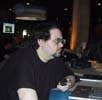 Still Water Senior Researcher John Bell is a web developer and data artist at the University of Maine. He has contributed to the development of The Pool, a system for fostering and documenting distributed creativity in digital arts; released several open-source web authoring tools; and given birth to an artificial intelligence that accidentally committed suicide. Many of his projects focus on trust in online communities and maintaining intellectual integrity in environments where there are few consequences to ignoring it. His work has been featured in Wired online and he presented CodePlay@UMe at Ars Electronica's Electrolobby Kitchen in 2003.
Still Water Senior Researcher John Bell is a web developer and data artist at the University of Maine. He has contributed to the development of The Pool, a system for fostering and documenting distributed creativity in digital arts; released several open-source web authoring tools; and given birth to an artificial intelligence that accidentally committed suicide. Many of his projects focus on trust in online communities and maintaining intellectual integrity in environments where there are few consequences to ignoring it. His work has been featured in Wired online and he presented CodePlay@UMe at Ars Electronica's Electrolobby Kitchen in 2003.
As Still Water Research Fellow, John has been the primary developer on the Variable Media Network's Forging the Future project and contributed his innovative Telamon software to Still Water's ThoughtMesh distributed publishing tool. John is also adjunct faculty in the U-Me New Media department.
In John's own words:
Much of my previous work has been focused on the democratization of information that is made possible by network technologies; I bought in to the early ideals and optimism about how the Internet was going to transform education, information sharing, and social discourse in general. The most obvious expression of this was ALICE, an AI that I designed to see how well the modern Internet lived up to those early ideals and express its conclusions emotionally. Unfortunately ALICE became so depressed that it committed suicide shortly before I presented it publicly at Ars Electronica in 2003, but that ironically demonstrates how much potential for self-criticism the modern Internet retains.
Though ALICE only judged the current state of the Internet, most of my projects have focused on trying to promote the early Internet ethos rather than just express my disappointment in its current role as a niche of Internet culture. My work on The Pool has supported open culture and encouraged the sharing of intellectual labor. One of my major contributions to the Variable Media Questionnaire has been an epistemological shift from a work being defined by its components to its being defined by the perceptions of its consumers. Re:Poste was intended to combat the growing problem of sloppy journalism and online echo chamber reality by introducing expert community feedback to websites that had been broadcast-only. In many ways I even see the Design Patterns for New Media class I developed and am teaching as my local contribution to the global intellectual and educational principles I support in my online work.
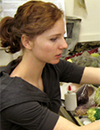 German-born Vanessa Vobis is an installation and multimedia artist whose research focuses on the underside of biological and cultural systems. Her custom-built ecosystems such as Plot, Body Beasts, and The Crystal World suggest natural history dioramas that are both otherworldly and familiar, repellent and compelling. Vobis co-founded the Species Science Lab with Craig Dietrich (below) to explore on the continuum from the microscopic to the transnational. Her quirky subject matter ranges from dust mites and microflora to oddities found at Walmart and Dollar Stores. Recently exhibited in Sweden, Estonia, and the Netherlands, her videos have won a Silver Eddy at the Cedar Rapids Film Festival. Vobis has a degree in art history and art practice from UC Berkeley and a MFA in Printmaking and Intermedia from the University of Iowa.
German-born Vanessa Vobis is an installation and multimedia artist whose research focuses on the underside of biological and cultural systems. Her custom-built ecosystems such as Plot, Body Beasts, and The Crystal World suggest natural history dioramas that are both otherworldly and familiar, repellent and compelling. Vobis co-founded the Species Science Lab with Craig Dietrich (below) to explore on the continuum from the microscopic to the transnational. Her quirky subject matter ranges from dust mites and microflora to oddities found at Walmart and Dollar Stores. Recently exhibited in Sweden, Estonia, and the Netherlands, her videos have won a Silver Eddy at the Cedar Rapids Film Festival. Vobis has a degree in art history and art practice from UC Berkeley and a MFA in Printmaking and Intermedia from the University of Iowa.
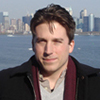 Still Water Senior Researcher Craig Dietrich develops systems for creative and scholarly examinations of transnational culture. Armed with early exposure to online environments such as LamdaMOO and Silicon Valley's TechMOOseum, and a 2008 Intermedia MFA from the University of Iowa, Dietrich works in both traditional and new media. Dietrich's offline production includes plywood recreations of airports and mall storefronts for the project USA Today. His online collaborations have harnessed database-driven interactive media, cell-phone texting (Z1SMS), and Dashboard widgets and streaming video (Iowa City Senior Center Television Online! and The Daily Palette, both with Jon Winet). Recent collaborations include the Mukurtu Archive and Plateau People's Web Portal content manager based on Aboriginal cultural protocols, ThoughtMesh, a semantic online publishing system produced by Still Water and the Vectors Journal. Dietrich presents often on new media, project development, and globalization and has recently exhibited at ZeroOne, San Jose and Legion Arts, Cedar Rapids with Vanessa Vobis (above). Dietrich is also on the editorial staff of USC's Vectors Journal of Culture and Technology in a Dynamic Vernacular.
Still Water Senior Researcher Craig Dietrich develops systems for creative and scholarly examinations of transnational culture. Armed with early exposure to online environments such as LamdaMOO and Silicon Valley's TechMOOseum, and a 2008 Intermedia MFA from the University of Iowa, Dietrich works in both traditional and new media. Dietrich's offline production includes plywood recreations of airports and mall storefronts for the project USA Today. His online collaborations have harnessed database-driven interactive media, cell-phone texting (Z1SMS), and Dashboard widgets and streaming video (Iowa City Senior Center Television Online! and The Daily Palette, both with Jon Winet). Recent collaborations include the Mukurtu Archive and Plateau People's Web Portal content manager based on Aboriginal cultural protocols, ThoughtMesh, a semantic online publishing system produced by Still Water and the Vectors Journal. Dietrich presents often on new media, project development, and globalization and has recently exhibited at ZeroOne, San Jose and Legion Arts, Cedar Rapids with Vanessa Vobis (above). Dietrich is also on the editorial staff of USC's Vectors Journal of Culture and Technology in a Dynamic Vernacular.
Wabanaki elders Miigam'agan and gkisedtanamoogk became the first Still Water Research Fellows in 2007, but their ongoing participation in Still Water programs has a longer history. They have participated in the Cross-Cultural Partnership initiative, the Connected Knowledge summits in 2006 and 2007, classes in indigenous media, and LongGreenHouse.
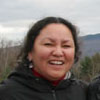 Miigam'agan is a member of the Mi'kmaq Nation, founder of the Elders and Youth Council, and cofounder of the Wabanaki Nations Cultural Resource Center, Apart from her activities as a Still Water Research Fellow at the University of Maine, she is also affiliated with the Wabanaki Mental Health, Bangor, First Nation Task Force on Youth Suicide Prevention, NB. Her life-work is dedicated to supporting empowerment for women, youth, families and communities and preserving and teaching Wabanaki Longhouse culture and spirituality.
Miigam'agan is a member of the Mi'kmaq Nation, founder of the Elders and Youth Council, and cofounder of the Wabanaki Nations Cultural Resource Center, Apart from her activities as a Still Water Research Fellow at the University of Maine, she is also affiliated with the Wabanaki Mental Health, Bangor, First Nation Task Force on Youth Suicide Prevention, NB. Her life-work is dedicated to supporting empowerment for women, youth, families and communities and preserving and teaching Wabanaki Longhouse culture and spirituality.
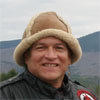 gkisedtanamoogk brings to Still Water a background in finding creative ways to bridge the socio-political polarization of the Indigenous Nations of Turtle Island and the newcomer nation-states of North America. His professional background is in human and community development and his interests include Law, History, and Spirituality. He is Wampanoag from the Federation of the Pokaunauket and practices the Ceremonial Life of his People; he is Otter and Turtle Clan; married with three Children; Education and Cultural Specialist and co-founder of the Anikwom Wholelife Center in Maine, whose work and proximity correlates to the Wabanaki Confederacy Territories. gkisedtanamoogk is currently adjunct faculty at the University of Maine at Orono.
gkisedtanamoogk brings to Still Water a background in finding creative ways to bridge the socio-political polarization of the Indigenous Nations of Turtle Island and the newcomer nation-states of North America. His professional background is in human and community development and his interests include Law, History, and Spirituality. He is Wampanoag from the Federation of the Pokaunauket and practices the Ceremonial Life of his People; he is Otter and Turtle Clan; married with three Children; Education and Cultural Specialist and co-founder of the Anikwom Wholelife Center in Maine, whose work and proximity correlates to the Wabanaki Confederacy Territories. gkisedtanamoogk is currently adjunct faculty at the University of Maine at Orono.
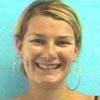 A specialist in art outside the box, artist and curator Sarah Last has produced cutting-edge installations and festivals for the better part of a decade in the Australian outback. As curator at the Wagga Wagga Art Gallery, Wagga Space Program, and director of the Booranga Writers' Centre, Sarah has organized unusual site-specific audio programs in abandoned factories, on moving railroad cars, and in the open paddocks of New South Wales. Her "Unsound" festivals probe unexpected territories, both figuratively and literally; for one festival, Sarah helped Australian artist Alan Lamb string wire for vast distances over the Australian desert and listen to its resonance frequencies using styrofoam boxes. Sarah has been an artist-in-residence at the NSW Arts Gunnery Studios in Sydney and was awarded an inaugural 'ArtsLab' grant from the Australia Council for the Arts. She has been a visiting Still Water Research Fellow in fall 2005 and fall 2007.
A specialist in art outside the box, artist and curator Sarah Last has produced cutting-edge installations and festivals for the better part of a decade in the Australian outback. As curator at the Wagga Wagga Art Gallery, Wagga Space Program, and director of the Booranga Writers' Centre, Sarah has organized unusual site-specific audio programs in abandoned factories, on moving railroad cars, and in the open paddocks of New South Wales. Her "Unsound" festivals probe unexpected territories, both figuratively and literally; for one festival, Sarah helped Australian artist Alan Lamb string wire for vast distances over the Australian desert and listen to its resonance frequencies using styrofoam boxes. Sarah has been an artist-in-residence at the NSW Arts Gunnery Studios in Sydney and was awarded an inaugural 'ArtsLab' grant from the Australia Council for the Arts. She has been a visiting Still Water Research Fellow in fall 2005 and fall 2007.
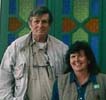 Australians Julia and Charles Yelton are internationally recognized experts in the study of sustainable design known as Permaculture. Armed with backgrounds in computer engineering, ceramics, and landscape design, the Yeltons cut their Permaculture teeth at Australia's Crystal Waters community, then went on to work with the INSAN Permaculture Institute in Nepal, hill tribes in northern Thailand, an alternative energy group in Wales, and a natural Permaculture village in Bali. In Whitefield, Maine, the Yeltons established a passive-solar, energy-efficient homestead with a four-season garden to demonstrate that it is indeed possible to grow lettuce in January--not to mention staying warm without oil or gas and redirecting waste water and food to build fertile soil.
Australians Julia and Charles Yelton are internationally recognized experts in the study of sustainable design known as Permaculture. Armed with backgrounds in computer engineering, ceramics, and landscape design, the Yeltons cut their Permaculture teeth at Australia's Crystal Waters community, then went on to work with the INSAN Permaculture Institute in Nepal, hill tribes in northern Thailand, an alternative energy group in Wales, and a natural Permaculture village in Bali. In Whitefield, Maine, the Yeltons established a passive-solar, energy-efficient homestead with a four-season garden to demonstrate that it is indeed possible to grow lettuce in January--not to mention staying warm without oil or gas and redirecting waste water and food to build fertile soil.
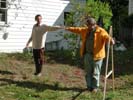 Since establishing a presence in Maine, the Yeltons have joined in a number of projects by the local ESTIA eco-peace community established by U-Me Peace Studies professor Emily Markides, including leading U-Me students on a two-week Permaculture intervention in Hawai'i's main island and coordinating the design and growth of a community food forest on the island of Cyprus. Julia and Charles are hands-on advisors to Still Water's LongGreenHouse project, where in fall 2007 they joined U-Me students led by Markides and Still Water co-director Joline Blais in erecting a 50-foot greenhouse, coldframe, and 200 running feet of swaled gardens.
Since establishing a presence in Maine, the Yeltons have joined in a number of projects by the local ESTIA eco-peace community established by U-Me Peace Studies professor Emily Markides, including leading U-Me students on a two-week Permaculture intervention in Hawai'i's main island and coordinating the design and growth of a community food forest on the island of Cyprus. Julia and Charles are hands-on advisors to Still Water's LongGreenHouse project, where in fall 2007 they joined U-Me students led by Markides and Still Water co-director Joline Blais in erecting a 50-foot greenhouse, coldframe, and 200 running feet of swaled gardens.
In a world of shrinking energy resources, Charles and Julia Yelton offer a positive and practical approach to redesigning environments and livestyles to live more lightly on the planet.



